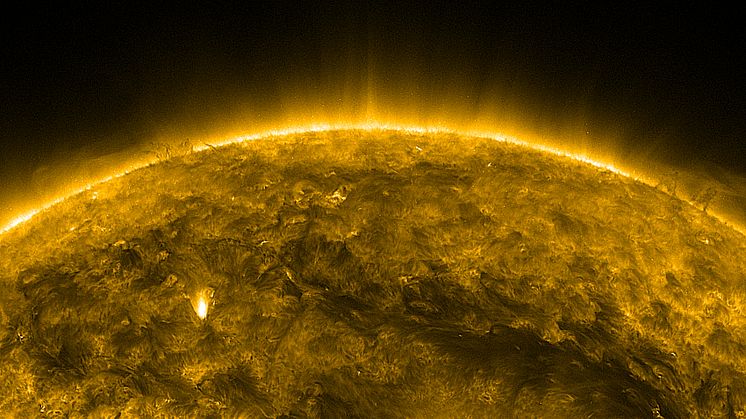
Press release -
Northumbria to help build world’s biggest solar telescope in £220 million project
Experts from Northumbria University, Newcastle are taking part in an international project to build the world’s biggest and most revolutionary solar telescope.
The $344 million (£220m) Daniel K Inouye Solar Telescope, to be known as DKIST, will be situated on Haleakala Mountain in Maui, Hawaii, and aims to unlock the secrets of the Sun. With a four-metre diameter primary mirror, the super-telescope will be able to pick up unprecedented detail on the Sun’s surface – the equivalent of being able to examine a £1 coin from a distance of 100km. It is hoped that DKIST will address fundamental questions at the core of contemporary solar physics. This will be achieved via high-speed spectroscopic and magnetic measurements of the solar photosphere, chromosphere and corona.
Northumbria’s Solar Physics research group will play a lead role in developing software to understand data from the telescope. Dr Richard Morton, Leverhulme Trust Early Career Research Fellow in the Department of Mathematics and Information Sciences, is the project lead at Northumbria.

Dr Richard Morton
He said: “DKIST is an exciting project that will revolutionise our understanding of the Sun and how it influences our lives. The Solar Physics research group at Northumbria will develop software to probe data from DKIST, providing key insight into the physical mechanisms responsible for energy transfer in the Sun's atmosphere and how this relates to solar variability and the generation of space weather, including solar flares, which can be hazardous to our technologically-advanced society.”
Northumbria University’s Pro Vice-Chancellor for Research and Innovation, Professor George Marston, said: “We are delighted to be one of eight UK universities helping to support the construction of the world’s most powerful solar telescope. Northumbria’s role in this international project clearly demonstrates the University’s ongoing commitment to driving scientific breakthroughs and technological innovation through the excellence of our world-class research and the expertise of our academics.” Professor Marston, who spent two years as a Resident Research Associate at NASA Goddard Space Flight Center near Washington DC, added: “The DKIST will address fundamental questions in contemporary solar physics; in addition, solar activity drives ‘space weather’ and has profound effects on Earth’s climate and global communications, highlighting the relevance of the research to important societal issues.”
Eight UK institutes will be working as a consortium on DKIST. The project is led by Queen's University Belfast and includes Armagh Observatory, Northumbria University, University College London, and the Universities of Glasgow, Sheffield, St. Andrews and Warwick. The consortium will partner with Belfast-based company and Queen’s University spinout Andor Technology and the Science and Technology Facilities Council. It will oversee the development and delivery of the cameras, and take the lead in supporting the UK solar physics community in their use of DKIST by providing a set of processing tools for DKIST data, synthetic observations to validate diagnostic approaches, and support for developing observing proposals. DKIST is funded by the US National Science Foundation with £2.5m of funding for the cameras provided by the Science and Technology Facilities Council.

The site of the DKIST Telescope, Haleakala Mountain in Maui, Hawaii
Northumbria recently launched its Think Physics project to inspire more young people, especially girls and under-represented groups, to engage with Science, Technology, Engineering and Mathematics (STEM) from Early Years to Higher Education and into their careers. The University also recently announced an investment of £6.7 million in STEM facilities, co-funded by the Higher Education Funding Council for England (HEFCE), to help drive world-class research and teaching across STEM disciplines, and an increased flow of highly-employable graduates into industry. Northumbria University provides undergraduate and postgraduate courses in Physics and Physics with Astrophysics. For more information go to:https://www.northumbria.ac.uk/physics
Categories
Northumbria is a research-rich, business-focussed, professional university with a global reputation for academic excellence. To find out more about our courses go towww.northumbria.ac.uk
If you have a media enquiry please contact our Media and Communications team at media.communications@northumbria.ac.uk or call 0191 227 4571.







